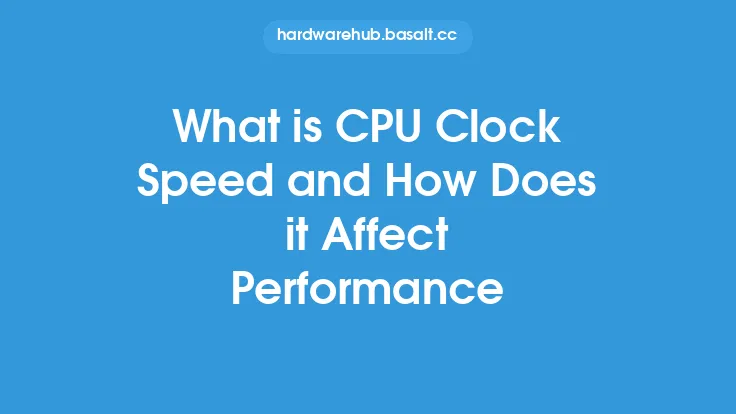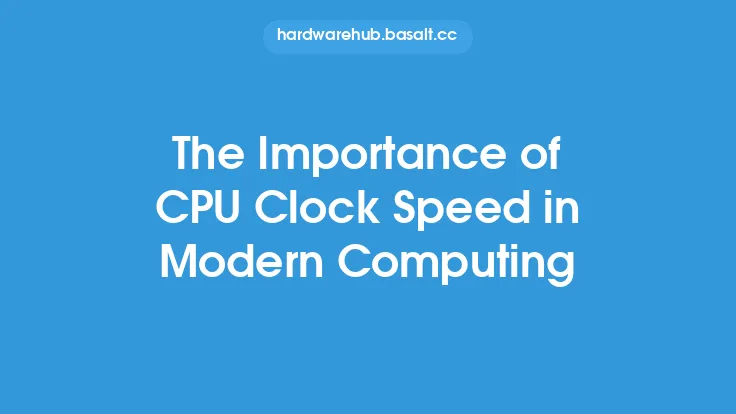When it comes to everyday computing tasks, the CPU clock speed plays a significant role in determining the overall performance of a system. The clock speed, measured in GHz (gigahertz), represents how many instructions a CPU can execute per second. A higher clock speed generally indicates better performance, but it's essential to understand how it relates to various tasks and applications.
Introduction to CPU Clock Speed and Everyday Computing
In everyday computing, tasks such as web browsing, email, office work, and media consumption are common. For these tasks, a moderate clock speed is often sufficient. Most modern CPUs have a clock speed ranging from 2.0 GHz to 4.0 GHz, which is more than enough for general use. However, for more demanding tasks like video editing, 3D modeling, and software development, a higher clock speed can significantly improve performance.
The Impact of CPU Clock Speed on Multitasking
Multitasking is a common scenario in everyday computing, where users run multiple applications simultaneously. In such cases, the CPU clock speed plays a crucial role in ensuring smooth performance. A higher clock speed allows the CPU to switch between tasks more quickly, reducing the time it takes to complete each task. This is particularly important for tasks that require frequent context switching, such as web development, where a developer may need to switch between coding, debugging, and testing.
CPU Clock Speed and Resource-Intensive Applications
Resource-intensive applications like video editing software, 3D modeling tools, and scientific simulations require high CPU clock speeds to perform efficiently. These applications often rely on complex algorithms and require the CPU to execute a large number of instructions per second. A higher clock speed can significantly reduce the time it takes to complete these tasks, making it essential for professionals who work with such applications.
The Relationship Between CPU Clock Speed and Power Consumption
There is a direct relationship between CPU clock speed and power consumption. As the clock speed increases, so does the power consumption. This is because the CPU requires more energy to execute instructions at a higher rate. However, modern CPUs often feature power-saving technologies like dynamic voltage and frequency scaling (DVFS), which adjust the clock speed and voltage based on the workload. This helps to balance performance and power consumption, making it possible to achieve high clock speeds while minimizing energy usage.
CPU Clock Speed and Overclocking
Overclocking is the process of increasing the CPU clock speed beyond its factory-set limit. This can be done to squeeze out extra performance from the CPU, but it also increases the risk of overheating, instability, and reduced lifespan. Overclocking requires careful consideration of the CPU's thermal limits, power supply, and cooling system. It's essential to monitor the CPU's temperature, voltage, and performance to ensure stable operation and prevent damage.
The Role of CPU Clock Speed in Determining System Bottlenecks
In many cases, the CPU clock speed can be a bottleneck in system performance. If the CPU is not fast enough, it can limit the performance of other components like the graphics card, memory, and storage. For example, a high-end graphics card may not be able to perform at its best if the CPU is not fast enough to feed it with data. Similarly, a fast storage drive may not be able to transfer data quickly if the CPU is not fast enough to process it. Therefore, it's essential to balance the CPU clock speed with other system components to achieve optimal performance.
CPU Clock Speed and Future-Proofing
When it comes to future-proofing a system, the CPU clock speed plays a significant role. As software and applications become more demanding, a higher clock speed can help ensure that the system remains relevant and performant. Additionally, emerging technologies like artificial intelligence, machine learning, and virtual reality require high-performance CPUs to function efficiently. Therefore, investing in a CPU with a high clock speed can help future-proof a system and provide a better user experience.
Conclusion
In conclusion, CPU clock speed is a critical factor in determining the performance of a system in everyday computing tasks. While a moderate clock speed is sufficient for general use, more demanding tasks require higher clock speeds to perform efficiently. Understanding the relationship between CPU clock speed and various tasks, as well as its impact on multitasking, resource-intensive applications, and power consumption, can help users make informed decisions when selecting a CPU or upgrading their system. By considering the CPU clock speed and its role in determining system performance, users can ensure a smooth and responsive computing experience.





